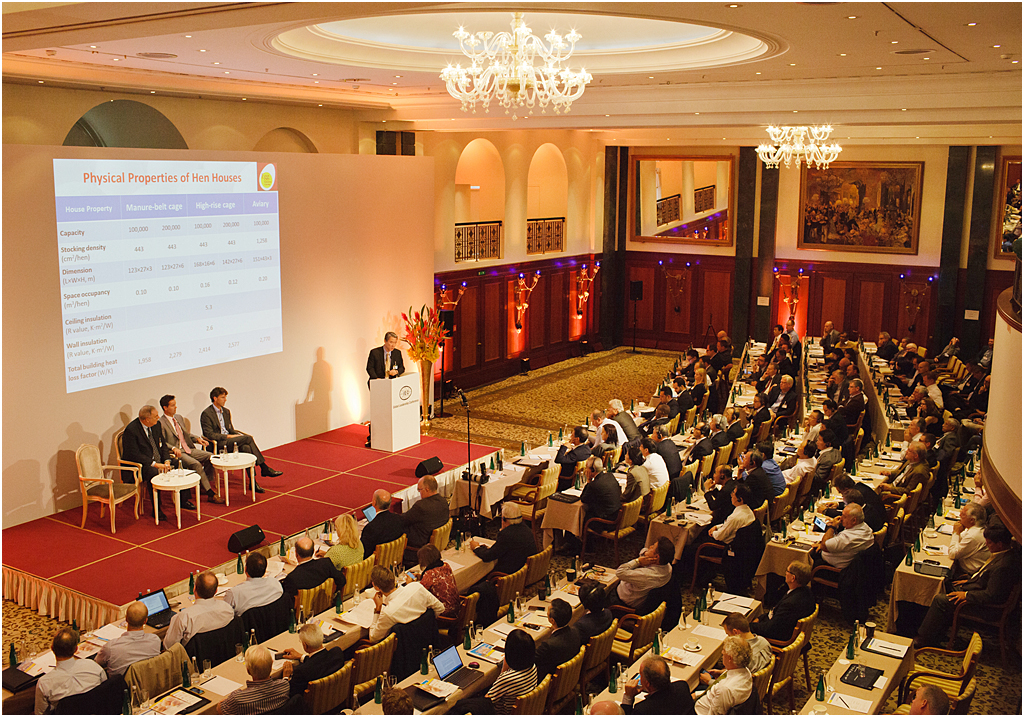



Biosecurity: Key to Success in the Egg Industry
GERMANY – The International Egg Commission (IEC) chose Berlin to host its 2015 Global Leadership Conference. Attendees from all over the world spent four days in the German capital discussing trends and challenges affecting the egg industry, writes Nuria Martínez Herráez, Editor, ThePoultrySite.Four days of intense debate focused primarily on biosecurity and avian influenza, with particular emphasis on last winter’s avian influenza outbreak in the US.
*
¿Habla español? Read about the IEC meeting in Spanish:
La industria mundial del huevo debate sobre influenza aviar y bioseguridad
Bioseguridad, la clave para el éxito de la industria avícola
During the Avian Influenza Summit, several international experts, with backgrounds ranging from universities, research centres to OIE representatives, addressed avian influenza from their various perspectives.
Chad Gregory, from United Egg Producers, focused on the recent US avian influenza outbreak, described as “the worst animal disease outbreak in the history of the US.”
He highlighted how badly the egg industry was affected and how quickly the virus spread.
Mr Gregory said depopulation needs to happen quickly to stop the virus from spreading.
Compartmentalisation: An Ally of Disease Control
Kevin Lovell, from the South African Poultry Association (SAPA), explained the potential of compartmentalisation not only for avian influenza control but for other avian diseases, such as Newcastle Disease.
By splitting the poultry population into compartments during a disease outbreak, live poultry and poultry products can continue to be traded from non-infected compartments. Moreover, it simplifies disease surveillance and helps protect breeding stock.
He also explained the difference between “compartmentalisation” and “zoning”. The former is based on biosecurity criteria, whereas the latter is based on geographic criteria.
Dr Alejandro Thiermann, from the OIE, further addressed compartmentalisation. He identified the main challenges of an effective application of the system - technical issues, the epidemiology of the different diseases, and the structure and distribution of the animal population.
An entire session was focused on biosecurity. An international expert panel discussed practical biosecurity applications, from its role in preventing avian influenza (and many other avian diseases) to its relevance to egg businesses.
An often overlooked aspect is the importance of biosecurity during depopulation. Dr Klaus-Peter Behr, from AniCon Labor, pointed out that viruses spread through culling crews, tools, and carcass transports. Therefore, biosecurity is important not only before a disease outbreak but also during culling.

Egg Consumption’s Impact on Human Health
As part of the IEC conference, the International Egg Nutrition Consortium presented a symposium entitled “Exploring the Impact of Egg Consumption on Various Aspects of Human Health and Disease”. Three speakers presented new research.
Dr Nina Geiker, from Copenhagen University, Denmark, discussed “The effects of dietary protein on human health”. She highlighted the good biological value of eggs, which top the list of food sources with a high protein content.
Dr Bruce Griffin, from the University of Surrey, United Kingdom, focused on his research on eggs and diabetes.
Dr Mario Díaz, from the University of Oviedo, Spain, discussed his research on egg yolk fractioning. Fractioning could help in the development of an egg with lower cholesterol content. Dr Díaz also illuminated other applications of fractioning egg yolks, both within and outside the food industry.
Changing Times at the International Egg Commission
During this meeting, representatives from many countries discussed the opportunities and challenges of both their domestic egg and egg processing industries, giving an overview of the growth and development of the egg industry globally.
César de Anda, chairman of the IEC for the last two years, stepped down to make way for his successor, Ben Dellaert, Holland, who will take the lead for the next two years.











